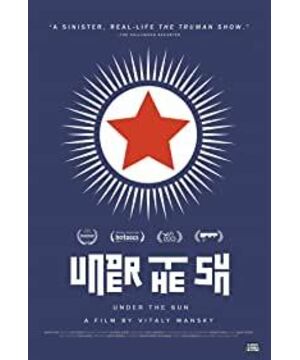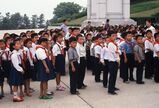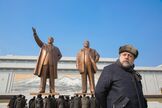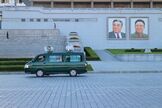The interest in this film is not only because of its North Korean theme; it is more about the way of expression, because this film is called Mansky's "Most Vertov-like film".
In the 1920s, the Soviet filmmaker Djiga Vertov shocked the world with his film theory and practice. Vertov's conception of real films forms a complete system from observation, shooting to editing, often using seemingly abnormal images to explore and organize objective phenomena. In such a presentation, the suddenly opened appearance is shocking and memorable, and at the same time, outside the image, the viewer is aware of another "truth" that may exist. To this day, looking back at his writings, I still feel full of power.
How to present reality? This is one of the most difficult problems with documentary filming.
The subject is aware of the existence of the lens, and has already begun to modify it unconsciously. What's more, the person being filmed is acting according to the script, and the filming person is also interfered and monitored everywhere. In such an environment, is there any possibility worth exploring?
That's how Mansky started shooting: characters are played according to script, filming is limited, no talk to the actors is allowed, there is always supervision, and the footage is reviewed daily.
Later, when I saw the sporadic interviews with Mansky, he said that when he went to North Korea to make a documentary, he had to accept the many restrictions. Even so, he still wanted to go, because he could learn something "about my country and my family's past."
The whole film is not thrilling to watch, or climax after another.
Mansky's technique is also simple, that is, juxtaposition: the scene that North Korea wants to show to the world is put together with the process of being interrupted, directed, and interfered with during the filming process, thereby forming an absurd effect.
A family dinner scene with a friendly atmosphere and laughter; followed by a guide who suddenly appeared like a ghost in the same scene. At this time, the family members looked serious, put down the dishes, and listened attentively; in the workshop, the female workers were full of spring breeze, marching and talking; Connected to the instructor interrupted the march, manipulated the position, and taught the opportunity face-to-face. Old soldiers decorated with medals tell anti-American stories for children, and there will also be flashes of mentors.
It was as if the back curtain of a puppet show suddenly slipped, and the puppeteer appeared.
In some scenes, I will think of Antonioni's "China". Those slightly lengthy and protracted shots have a dull feeling. Thinking back then, the situation that Antonioni encountered was roughly similar to that of Mansky. However, Antonioni did not secretly photograph the surveillance and guides into the screen, but only occasionally prompted in the narration. Mansky's narration is less. After all, in Mansky's time, images have long been popular, and many things do not need to be prompted.
In terms of content, Antonioni's works are even richer, which may be related to the change of shooting scenes; of course, it can also be seen that Mansky's shooting environment is more cramped.
I remember Antonioni performing acrobatics for twenty minutes at the end of "China". When I first saw it, I didn't quite understand it, but now it seems to be a contrasting effect; using a joyful, highly trained, and different life performance scene to set off the pale and even dull passages in front of it, it is ultimately absurd. mean.
When I was a kid, I liked to cut paper.
The pattern is not drawn with a pen, but is drawn on a wooden board with a knife facing the pattern. After it's done, I like the complete, vivid effect, and focus on the finished product and throw away the broken bits. I remember one time, I accidentally put together the cut frame and scraps, and I actually put together another piece! Just one yin and one yang.
Mansky was born in the Soviet Union in 1963. This is a country where many film masters are born. They not only use films to narrate, but more importantly, they have formulated many important film grammars and rules.
Chinese people, you should understand that the Russian director used Vertov's technique to shoot North Korea.
View more about Under the Sun reviews







